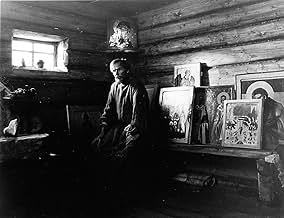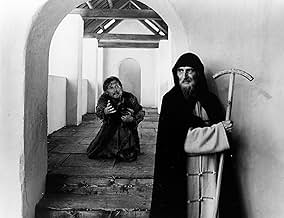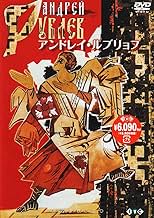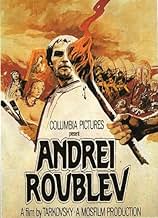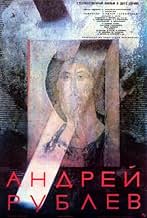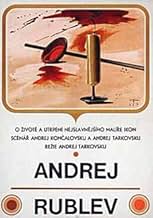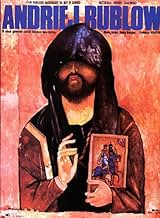Leben, Zeit und Leiden des russischen Ikonenmalers aus dem 15. Jahrhundert.Leben, Zeit und Leiden des russischen Ikonenmalers aus dem 15. Jahrhundert.Leben, Zeit und Leiden des russischen Ikonenmalers aus dem 15. Jahrhundert.
- Regie
- Drehbuch
- Hauptbesetzung
- Auszeichnungen
- 4 Gewinne & 1 Nominierung insgesamt
- Durochka
- (as Irma Raush)
- Patrikey, monakh
- (as Yu. Nikulin)
- Skomorokh
- (as R. Bykov)
- Stepan, sotnik Velikogo knyazya
- (as N. Grabbe)
- Foma, monakh
- (as M. Kononov)
- Starshiy liteyshchik
- (as S. Krylov)
- Tatarskiy khan
- (as B. Beyshenaliev)
- Aleksey, monakh
- (as A. Obukhov)
- Sergey
- (as Volodya Titov)
- Efim
- (as N. Glazkov)
Empfohlene Bewertungen
There are no cliches here, no stereotypes and no sucking up to the audience. A brutally honest and yet very moving, touching and optimistic film. And it is not about the nature of a genius. Rather, it is about a man's ability and duty to preserve and be true to his humanity, his freedom, his soul, his heart and his gift, no matter what century it is or what the circumstances are. Watch it to remind yourself of what it really means to be human.
The medieval society was deeply religious. The church influenced every aspect of people's lives from birth to death and was part of the state. It means religious leaders were as important as rulers.
In Russian society men were wearing beards and women covered hairs. Remove a beard from a man or uncover woman's hair and you will humiliate them, they would feel like modern people being undressed in public.
Paganism is a form of religion, where people believe in many gods instead of one. The main Russian pagan gods are the goddess of the earth and the god of the sun. Among others - the god of storms and lightning, the mythical young women living in forests and rivers. Despite many centuries of suppression of paganism by authorities some in modern Russia still celebrate the feast of Ivan Kupala (which could be translated as Ivan Gathering) depicted in the movie.
Also I have to mention, that Soviet censors told Tarkovski the movie is too cruel. They told him the scene with a burning cow, for example, is absolutely unacceptable. Tarkovski tried to defend the movie. The cow wasn't harmed, was his reasoning. Still the film was cut. The censors knew better what is good and what is not for the viewer.
This brings us to what is the message of Tarkovski in this film. There are many messages actually. I'll be telling only about one here, because it is not hidden. It is there, in the dispute between Rublov and Theophanes The Greek. They both are talented, both want to bring people to humanity. Theophanes is tired, he says - common people live in darkness, they are completely consumed by sin and the only way to make them humans is to scare them and punish them. Rublov advocates for love. He says: people live very difficult life, it's amazing how they endure it. We have to love them, to remind them, they are humans, they are Russians. You see, the first is the position of the Soviet system, the second - of Jesus Christ.
Me? I'm still sitting on the fence. :)
I recommend to watch this movie many times. You will do it without my recommendation though, if you (like me) will not understand everything from the first view and you like to think. The mesmerizing beauty of this movie will help you to return easier. For the first time be prepared for not a cakewalk. There are two things to consider here. One is the cruelty. Though it is absolutely necessary in this film, most of us living in a comfort of modern society are not ready to it. The other is the pace. Often it is a pace of real life.
Peace.
A bit difficult to review this movie. It is clearly the work of a master craftsman: the exquisite cinematography, the sheer scale of the subject matter and time period, the themes, the obvious adoration director Andrei Tarkovsky has for his subject.
Yet it is often quite a grind to watch: clocks in at well over 3 hours and moves very slowly. Several scenes will go by without development in plot or theme. Furthermore, the separate time periods don't necessarily form a narrative. They often just feel like things happening, with no connection between them.
While acknowledging that the film is well made, I fail to see how it is so highly regarded. I did not come away feeling that I had just watched a masterpiece, something incredibly profound or moving.
Wusstest du schon
- WissenswertesFilm debut of Anatoliy Solonitsyn, and the first of four movies he made together with director Andrei Tarkovsky before his death from cancer in 1982. Had Solonitsyn lived, he would also have played protagonist Andrei Gorchakov in Tarkovsky's Nostalghia (1983), as well as star in a project titled 'The Witch' which eventually became Tarkovsky's final production, Opfer (1986).
- PatzerThe smoothly-cut logs that feature many times in the early scenes are clearly cut with machinery not available in the early fifteenth century.
- Zitate
Andrei Rublyov: You just spoke of Jesus. Perhaps he was born and crucified to reconcile God and man. Jesus came from God, so he is all-powerful. And if He died on the cross it was predetermined and His crucifixion and death were God's will. That would have aroused hatred not in those that crucified him but in those that loved him if they had been near him at that moment, because they loved him as a man only. But if He, of His own will, left them, He displayed injustice, or even cruelty. Maybe those who crucified him loved him because they helped in this divine plan.
- Alternative VersionenSoviet television created a severely trimmed 101-minute version that the director did not authorize. Notable scenes removed from this version were the raid of the Tatars and the scene showing naked pagans. The epilogue showing details of Andrei Rublev's icons was in black and white as the Soviet Union had not yet fully transitioned to color TV.
- VerbindungenEdited into Ombres vives ...une autre histoire du cinema... (2013)
Top-Auswahl
- How long is Andrei Rublev?Powered by Alexa
Details
- Erscheinungsdatum
- Herkunftsland
- Sprachen
- Auch bekannt als
- Andréi Rublev
- Drehorte
- Produktionsfirmen
- Weitere beteiligte Unternehmen bei IMDbPro anzeigen
Box Office
- Budget
- 1.000.000 RUR (geschätzt)
- Bruttoertrag in den USA und Kanada
- 124.189 $
- Eröffnungswochenende in den USA und in Kanada
- 11.537 $
- 15. Sept. 2002
- Weltweiter Bruttoertrag
- 180.956 $
- Laufzeit3 Stunden 9 Minuten
- Farbe
- Sound-Mix
- Seitenverhältnis
- 2.35 : 1
Zu dieser Seite beitragen



